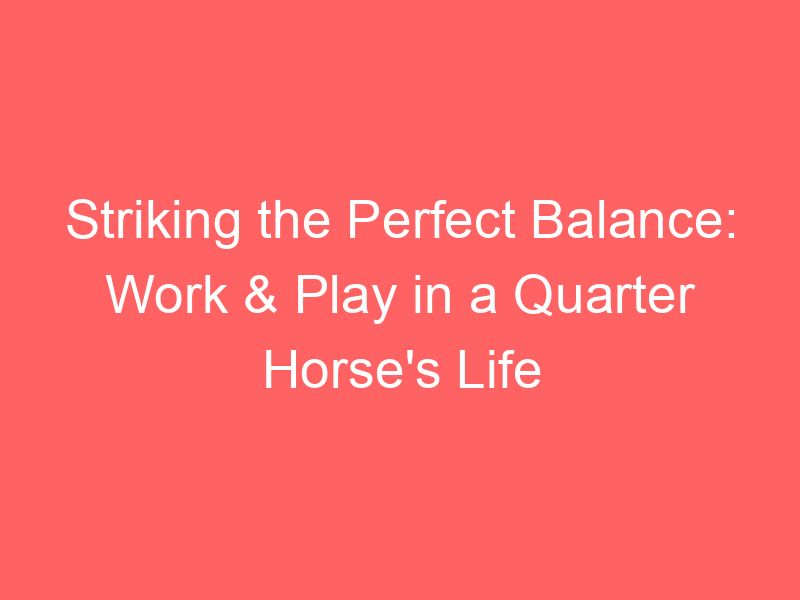
Introduction to Quarter Horse Care
When it comes to horse care, every breed has its unique needs and requirements. Among them, the Quarter Horse, known for its agility and speed, requires special attention. In this section, we will delve into the specifics of Quarter Horse care, focusing on understanding their unique needs and the importance of a balanced lifestyle.
- Understanding the Unique Needs of Quarter Horses
- Importance of a Balanced Lifestyle for Quarter Horses
Quarter Horses are a versatile breed, excelling in activities ranging from racing to rodeo events. Their muscular build and compact body require a diet rich in protein and energy. However, overfeeding can lead to obesity, a common issue among this breed. Regular exercise is also crucial to keep them in good shape and health.
Moreover, their fast-paced lifestyle makes them prone to injuries. Regular vet check-ups, proper hoof care, and a comfortable living environment can help prevent health issues. Understanding these unique needs is the first step towards providing optimal care for your Quarter Horse.
A balanced lifestyle is vital for the overall well-being of a Quarter Horse. This includes a balanced diet, regular exercise, and adequate rest. A balanced diet ensures they get the necessary nutrients for their high-energy activities. Regular exercise keeps them physically fit, while adequate rest allows their body to recover and rejuvenate.
Moreover, a balanced lifestyle also includes mental stimulation. Training sessions, social interactions with other horses, and playtime can help keep their mind sharp and active. Remember, a happy and healthy Quarter Horse is a result of a well-balanced lifestyle.
In the following sections, we will explore more about the equestrian lifestyle, Quarter Horse training, and how to balance work and play for the optimal health of your horse. Stay tuned to learn more about achieving the perfect balance in a Quarter Horse’s life.
The Equestrian Lifestyle: Work-Life Balance
Living the equestrian lifestyle is a unique experience that requires a delicate balance between work and play. This balance is crucial for both the rider and the horse to maintain health, happiness, and performance. Let’s delve into what work-life balance means in the equestrian context.
Defining Work-Life Balance in the Equestrian Context
In the equestrian world, work-life balance is about finding the right mix between the time spent on training and duties (work), and the time spent on leisure activities and relaxation (play). Both aspects are equally important for the well-being of the rider and the horse. Let’s break it down:
- Work: Training and duties
- Play: Leisure activities and relaxation
Work in the equestrian context involves all the tasks related to horse care and training. This includes feeding, grooming, exercising the horse, and practicing riding skills. It’s a demanding job that requires dedication, discipline, and physical effort. But it’s also a rewarding one, as it strengthens the bond between the rider and the horse and improves their performance.
Play, on the other hand, involves activities that allow both the rider and the horse to relax and enjoy their time. This can include leisurely rides, spending time in nature, or simply bonding with the horse. Play is crucial for mental health, as it helps to relieve stress and maintain a positive attitude.
Striking the right balance between work and play in the equestrian lifestyle is not always easy, but it’s essential for the well-being of both the rider and the horse. It’s about understanding the needs of the horse, respecting its limits, and making sure that there’s time for relaxation and enjoyment in the midst of all the hard work.
Importance of Work-Life Balance for Horse Riders
Work-life balance is a crucial aspect of any profession, and horse riding is no exception. Striking the right balance between work and leisure can have profound effects on a rider’s physical and mental health, as well as their performance in equestrian activities. Let’s delve into these benefits in more detail.
- Physical Health Benefits
Regular interaction with horses, combined with a balanced lifestyle, can significantly contribute to a rider’s physical health. Horse riding is a physically demanding activity that can help improve cardiovascular fitness, muscle tone, and overall strength. However, overworking can lead to fatigue and injuries. Therefore, it’s important to balance riding and training sessions with ample rest and relaxation to allow the body to recover.
- Mental Health Benefits
Spending time with horses is not just physically rewarding; it also offers numerous mental health benefits. Horses are known for their calming presence, which can help reduce stress and anxiety. Moreover, the sense of accomplishment that comes from improving riding skills can boost self-esteem and confidence. However, these benefits can only be fully realized when riders maintain a healthy work-life balance, allowing them to enjoy their time with their horses without feeling overwhelmed by excessive workloads.
- Improved Performance in Equestrian Activities
Finally, a balanced lifestyle can lead to improved performance in equestrian activities. Overworking can lead to burnout, which can negatively impact a rider’s performance. On the other hand, a rider who maintains a healthy balance between work and leisure is likely to be more focused, motivated, and productive during training sessions and competitions. This balance allows riders to fully enjoy their time with their horses, leading to a more positive and rewarding equestrian experience.
In conclusion, maintaining a healthy work-life balance is not just beneficial for horse riders—it’s essential. So, remember to take time for yourself, enjoy your leisure activities, and don’t forget to rest. Your body, mind, and horse will thank you!
Quarter Horse Training: Striking the Balance
Training a quarter horse is a delicate balance. It requires a well-thought-out plan that includes a training schedule and a variety of routines. This balance ensures that the horse is not only physically fit but also mentally stimulated.
Work: Training Schedules and Routines
Creating a successful training schedule and incorporating variety in routines is crucial in quarter horse training. Let’s delve into these aspects.
- Creating an effective training schedule
- Ensuring variety in training to prevent boredom and enhance skills
Creating an effective training schedule for your quarter horse is a process that requires careful planning. It’s important to consider the horse’s age, health, and current skill level. A typical schedule might involve training sessions 5 days a week, with each session lasting about an hour. This provides the horse with two rest days for recovery and relaxation. Remember, consistency is key in training. Regular training sessions help the horse to learn and retain new skills.
Just like humans, horses can also get bored with the same routine. To prevent this, it’s important to ensure variety in training. This could mean changing the training environment, introducing new exercises, or varying the intensity of workouts. For instance, you could alternate between light training days and intense workout days. This not only keeps the horse engaged but also enhances different skill sets. Furthermore, it prevents overworking the horse, which could lead to injuries.
In conclusion, striking the right balance in quarter horse training involves creating an effective training schedule and ensuring variety in routines. This approach ensures that the horse remains physically fit and mentally stimulated, leading to better performance and overall well-being.
Play: Leisure Activities for Quarter Horses
Every horse, including the agile and versatile Quarter Horse, needs time to play and relax. This is not just for fun, but it also contributes significantly to their overall health and well-being. Let’s explore some of the recreational activities that are suitable for Quarter Horses and the benefits they bring.
- Recreational activities for horses
Playtime for horses can be as simple as free time in a pasture or as structured as specific games. Here are a few activities that Quarter Horses might enjoy:
- Turnout Time: This is essentially free time in a pasture or paddock. It allows the horse to roam, graze, and interact with other horses. It’s a simple yet effective way to let your horse unwind.
- Trail Rides: A leisurely trail ride can be a great way for your horse to explore new environments, which can stimulate their mind and keep them engaged.
- Games: Playing games like ‘follow the leader’ or using horse toys can be a fun way to engage your horse’s mind and encourage movement.
- Benefits of play for horses
Play is not just about fun; it’s also about health. Here are some of the key benefits:
- Mental Stimulation: Play provides mental stimulation, which can help prevent boredom and stress. It can also improve problem-solving skills.
- Physical Health: Active play helps maintain a healthy weight and promotes cardiovascular health. It also helps to keep their joints flexible and muscles toned.
- Social Skills: If your horse plays with others, it can help them develop and maintain good social skills.
In conclusion, incorporating play into your Quarter Horse’s routine is not just enjoyable for them, but it’s also beneficial for their mental and physical health. So, ensure to strike a balance between work and play in your horse’s life.
Balancing Equestrian Duties: Work and Play with Horses
As an equestrian, it’s crucial to strike a balance between work and play with your horse. This not only ensures your horse’s well-being but also strengthens your bond with them. Let’s delve into how you can create a balanced schedule for work and play with your horse.
Creating a Balanced Work and Play Schedule
Creating a balanced schedule for your horse involves understanding their needs, allocating time for work and play, and adjusting the schedule based on their response. Here’s how you can go about it:
- Understanding your horse’s needs and preferences:
- Allocating time for work and play:
- Adjusting the schedule based on your horse’s response:
Every horse is unique and has different needs and preferences. Some horses may enjoy a rigorous workout, while others may prefer a more relaxed pace. Understanding your horse’s personality and preferences is the first step towards creating a balanced schedule.
Once you understand your horse’s needs, it’s time to allocate time for work and play. A good rule of thumb is to divide the day into three parts: work, rest, and play. Work could include training sessions, while play could involve free time in the pasture or engaging in fun activities like trail rides.
Monitor your horse’s response to the schedule. If they seem tired or uninterested, it may be time to adjust the schedule. Remember, the goal is to ensure your horse is happy and healthy, so don’t hesitate to make changes as needed.
In conclusion, balancing work and play with your horse is a delicate task that requires understanding, patience, and flexibility. By following these steps, you can create a balanced schedule that catifies both you and your horse.
| Work | Rest | Play |
|---|---|---|
| Training sessions | Quiet time in the stable | Free time in the pasture, trail rides |
Remember, a balanced equestrian life is a happy equestrian life. So, take the time to understand your horse, create a balanced schedule, and adjust as needed. Your horse will thank you for it!
Maintaining Horse Health: The Role of Work and Play
In the world of equestrian care, maintaining a horse’s health is a top priority. This involves a delicate balance of work and play. Let’s delve into the importance of these elements in maintaining a horse’s physical health.
Physical Health
Physical health is a crucial aspect of a horse’s overall wellbeing. It’s not just about keeping them fit, but also ensuring they are happy and content in their daily lives. Work and play both play significant roles in this.
- The role of work and play in maintaining physical health
- Signs of good physical health in horses
Work for a horse can include training, performing tasks, or participating in shows. This helps to keep their muscles strong and their bodies agile. Play, on the other hand, allows horses to relax and enjoy themselves. This can involve running freely in a field, interacting with other horses, or playing with toys. Both work and play contribute to a horse’s physical health by promoting exercise and movement, which are essential for muscle development and cardiovascular health.
There are several signs that indicate a horse is in good physical health. These include a shiny and smooth coat, clear and bright eyes, a body that is well-muscled and without excess fat, and a good appetite. A healthy horse is also active and alert, showing interest in its surroundings. Regular veterinary check-ups are also crucial in ensuring a horse’s physical health is maintained.
Remember, a balance between work and play is key to maintaining a horse’s physical health. Too much work can lead to stress and exhaustion, while too much play may not provide the necessary physical conditioning a horse needs. As a horse owner, it’s your responsibility to find that perfect balance.
| Signs of Good Physical Health | Description |
|---|---|
| Shiny and smooth coat | Indicates good nutrition and grooming |
| Clear and bright eyes | Sign of alertness and overall health |
| Well-muscled body | Shows regular exercise and good nutrition |
| Good appetite | Indicates overall health and well-being |
Mental Health
Just like humans, horses also need to maintain good mental health. It is essential for their overall well-being. The role of work and play significantly contributes to this aspect of their health. Let’s delve into the details.
- The Role of Work and Play in Maintaining Mental Health
- Signs of Good Mental Health in Horses
Work and play are two crucial elements in a horse’s life. They not only keep a horse physically fit but also mentally healthy. Work, in the form of training or performing tasks, provides a sense of purpose and keeps the horse’s mind active. On the other hand, play allows horses to relax, explore their environment, and interact with other horses, which is essential for their social well-being.
Studies have shown that horses that engage in a balanced routine of work and play exhibit lower levels of stress and anxiety. They are more content, cooperative, and easier to train. Therefore, it is crucial to strike a balance between work and play to ensure the mental health of your horse.
Recognizing the signs of good mental health in horses is equally important. A mentally healthy horse is generally calm, alert, and responsive. They show interest in their surroundings and in people, and they are eager to engage in work or play.
Other signs include a good appetite, regular sleep patterns, and positive interactions with other horses. If your horse exhibits these signs, it is likely that they are in a good mental state. However, any sudden changes in behavior, mood, or appetite could indicate a problem and should be addressed immediately.
In conclusion, maintaining the mental health of your horse is just as important as their physical health. By ensuring a balanced routine of work and play, and by being vigilant for signs of good mental health, you can help your horse lead a happy, healthy, and fulfilling life.
Conclusion: The Perfect Balance in a Quarter Horse’s Life
As we reach the end of our discussion, it’s crucial to reflect on the importance of maintaining a healthy work-life balance for your Quarter Horse. This balance is not just about ensuring your horse’s physical well-being, but it’s also about their mental and emotional health. Let’s recap the key points and provide some final thoughts and advice for horse owners.
- Recap of the importance of work-life balance in a Quarter Horse’s life:
- Final thoughts and advice for horse owners:
Quarter Horses, known for their agility and speed, require a balanced lifestyle to maintain their peak performance. This balance involves a mix of work, rest, and play. Overworking can lead to stress and health issues, while too much idle time can result in boredom and behavioral problems. Therefore, a perfect balance is essential for a Quarter Horse’s overall well-being.
As a horse owner, it’s your responsibility to ensure your Quarter Horse leads a balanced life. This includes providing regular exercise, adequate rest, and engaging playtime. Remember, every horse is unique and what works for one might not work for another. Therefore, it’s important to understand your horse’s individual needs and adjust their routine accordingly.
Moreover, regular health check-ups are crucial to monitor your horse’s health and detect any potential issues early. A healthy diet is also a key part of maintaining a balanced lifestyle. Feed your horse a balanced diet rich in nutrients to keep them healthy and active.
In conclusion, a balanced lifestyle is the key to a happy and healthy Quarter Horse. As the saying goes, “A happy horse is a healthy horse.” So, strive to provide the best care for your horse and enjoy the rewarding experience of horse ownership.









